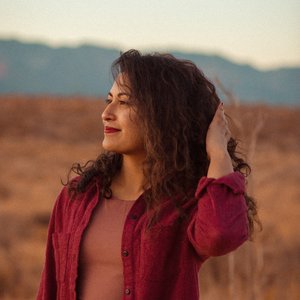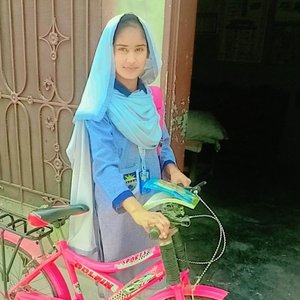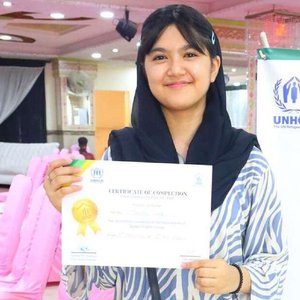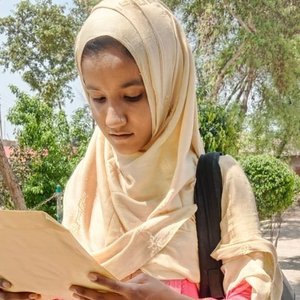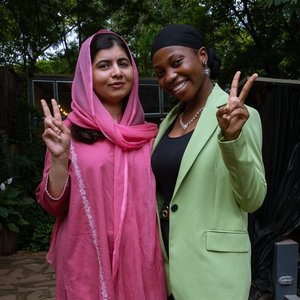A week in the life of a 14-year-old student in Kashmir during the pandemic
(Courtesy of Sualiha Khan)
Thursday, May 14
The coronavirus cases, along with the fear, are growing every day. My father has started going to the office amidst the lockdown as his work comes under essential services. He works at LIC (Life Insurance Corporation of India). This frequently distresses us all, though my father sanitizes himself properly even before gazing at us.
Sometimes, I find all this regular disinfection process funny: he comes back home, goes to the washroom outside the house, washes himself clean, then goes straight to his room, takes a bath, changes all his clothes and then puts them away. Disinfection seems much more time consuming than the day’s work!
As for our schools, they have been shut for about two months now and online classes are the only option left. The lockdown is surely horrifying, but somewhere, it provides the opportunity for you to grow. Unexpected and unwanted things might hurt at first, but they leave making a better person out of you.
Friday, May 15
(Courtesy of Sualiha Khan)
I woke up early today, had my Sehri (that’s the food you have early in the morning just before fasting), prayed and then went back to sleep for a while. The holy month of Ramadan is in full progress.
Later this morning, I had my online classes for the day. Although I enjoyed all my classes, I still believe online classes can never replace classroom learning. There’s just a different aura in person. The school itself is a building of morals and ethics and I dearly miss all my friends and even the teachers. My studies are going quite well. We are even taking online exams. I secretly wonder how many of the children would be honest in the online tests.
I have friends who are chilled out about the fact that there is no school. I also have friends who are freaking out due to the pandemic and some creative ones who are trying their hand at different skills. Chit-chatting with friends remains to be my favourite leisure-time activity. I reckon sharing your feelings and laughing your heart out to your friends is the best feeling in the universe and it is the best thing to be doing to help yourself through seclusion. After all, social distancing does not mean emotional distancing.
Once, you remain connected with pals, you realise that you aren’t the only teenager feeling the repercussions of the unprecedented isolation, which may come down upon many as a shock. Apart from this, I play board games like Ludo or Othello with my family. My mother is doing a lot to support our mental well-being. She even played badminton with us and we had the best time together. I believe parents play the most important role in a teenager’s life, though teenager’s lives revolve mostly around friends.
I now realise sorrow or near depression can be cured not by isolating yourself but by trying to spend time with the people around you. There’s beauty everywhere and in every situation, it just needs an eye to get noticed.
Thursday, May 21
Today I woke up as early as I could. There was something special about the ambience today. I had my Zoom class at 9 a.m. sharp and I was over excited about everything. I had my breakfast in a hurry and rushed to the room. Just as I sat down to open the Zoom app, it wouldn’t work. I tried and retried, but all in vain. “Please check your internet connection” was all I could see on the screen. Eventually, I decided to call my friend up, but to my utter surprise, the mobile wouldn’t work as well! It took me a moment to realise what was happening — there was again a communications blackout in the region! I couldn’t grasp the fact that I woke up on a fine morning but the world had turned topsy-turvy for me.
I asked my father the reason for the communications blackout. I presumably should have known for we are all well-acquainted with this happening in Kashmir either due to an ongoing skirmish between the troops and the local militants or because of the death of a militant. The latter proved to be the reason today. Wrath, sorrow, chaos, self-pity, frustration — this is what it feels to be cut off from the rest of the world.
I was excited for my online classes and then this happened. We were waiting for the restoration of 4G internet after we were cut off indefinitely on 5 August 2019 due to the revocation of Article 370 of the Indian constitution (this article gave special rights to Kashmir). We had no access to communications for more than a month. Then in January or February of this year, 2G internet with access to limited websites was restored.
It is already very difficult to do video calls on such a low connectivity and then 2G was disconnected too. The internet and social media was the only respite left for us during COVID times. Whether for social connections, economic growth or as a platform for policymakers to address the general public, we need the internet. Now we continue to stay isolated.
I do not understand why the internet needs to be taken away at the slightest hint of danger. There must be a balance between national security and rights of citizens.
Wednesday, May 27
Eid has just come and gone. Initially, I wondered how to celebrate this Eid, but Allah gives you the strength to do the impossible and you don’t even realise. The credit for this Eid being so unusually special goes to my parents. They made sure we had multiple dishes of the famous Kashmiri wazwan prepared beforehand. Wazwan is a traditional Kashmiri cuisine mainly including several dishes prepared from mutton. From meatballs, lamb ribs and spicy curries to kebabs (mutton finger rolls) and sweet mutton soup. It has everything to make it a perfect appetizer. It is a must on the occasion of Eid. I also received Eidi (the money children get on Eid from their elders) from my near relatives, and although we didn’t do anything out of the box to celebrate this day, it was still fun. We saw some family and friends while physically distancing. My cousin and next-door neighbour were here. My grandparents, who live a couple of houses to the west from ours, also paid us a visit. My cousin, who is fairly older in age than me, still makes great company. We could talk the whole day about books and suddenly move into serious political discussions or crack jokes just the next moment.
“I now realise sorrow or near depression can be cured not by isolating yourself but by trying to spend time with the people around you. There’s beauty everywhere and in every situation, it just needs an eye to get noticed.”
However, the best thing about this Eid was that there was scarcely any noise of firecrackers or sight of people crowding into the markets or our famous botanical gardens for an outing. The roads were still deserted and the celebrations limited to one’s homes only. I found it an exemplary display of patience. People are contributing towards the community in these small ways.
Thursday, May 28
158,333. The number of coronavirus cases in India. The six-digit sum is worrying. There is a state of distress, especially when my father is still regularly going to his office. I sometimes, in the middle of nowhere, start worrying about the unknown future and I wish my father could stay home. Just as these thoughts strike me, I think of the front-line workers, the ones who are working tirelessly, risking their very own lives. What about their families? How worried would they be right now? Worst of all, these workers don’t even have sufficient PPE kits for their protection. So many of these medical and paramedical workers have contracted the virus and lost their lives.
This wakes my conscience up and I try to help people in every possible way I can. I console my friends who are having a difficult time these days or do charity work with my mother. She provides financial support to a couple of local orphanages and these days, I have also started donating my pocket money to the humble cause. But all of it still seems to be a drop in the ocean.
This is what happens when I overthink: I become agonised. So I tend to look to the brighter side. There’s always a brighter side to things. Yes, there’s panic and distress all over because of the pandemic, but in spite of everything exists an instinct of love, and above all, beauty. From dusk till dawn, you can hear the chirping of birds you never knew existed, the pollution is efficiently decreasing,and nature is thriving. The world has come to an abrupt halt, but everything except mankind seems at peace.
Saturday, May 30
There is no clue when schools will reopen, nor any hope. The lockdown still prevails. India’s condition, as far as COVID-19 is concerned, is worsening with each passing day.
I have started missing the afternoon walks in the silhouette of the Chinar trees or the hustle and bustle of the market, or even our congested school. I miss the normal life that was back in track in Kashmir after six long months of a curfew in the Kashmir region. As the househelp has stopped coming, my sister and I sometimes help my mother with her chores, though I mostly try to slip out of the scene (in vain).
However, life seems a chore now: waking up, eating, studying, having to pass the time somehow and so on. Necessity has made it such that I and my sister end up doing sheepish things like shooting watermelon seeds out of our mouths to see whose seed goes the farthest. Though I thoroughly wish we could write our names on the seeds because it often leads to chaos and turmoil. But I know we must get used to this life. We have to learn living this way — even the lockdown seems impossible to be lifted. This is when books come to your rescue. You would never get bored reading books. I recently completed reading the books “Jane Eyre” by Charlotte Brontë and “To Kill a Mockingbird” by Harper Lee, and am now reading “The Alchemist” by Paulo Coelho. I love the fact that books teach us things that are otherwise beyond our understanding. We are able to get a panorama of the world from a completely different view. Books are a break from the monotonous world — a different kind of peace takes over while reading. Reading should be one’s routine for lifetime.
(Courtesy of Sualiha Khan)
Sunday, May 31
As I write to you today, I sit peacefully near my window, looking at a peach tree in the golden sunshine. I have just come upstairs after a day of watching TV and listening to music. Sometimes, it is good to listen to the voices coming from your heart rather than simply ignoring them.
I try to imagine a world post-pandemic. It would definitely never be the same again. Masks will become a part of everyday life. Social gatherings will be replaced by social distancing. World politics would change considerably. The pandemic has shown the worst in some people and the exact opposite in others.
This pandemic has taught me an important lesson: However bad the conditions get, there always exists an invisible faint note of hope.
 Read more
Read more









